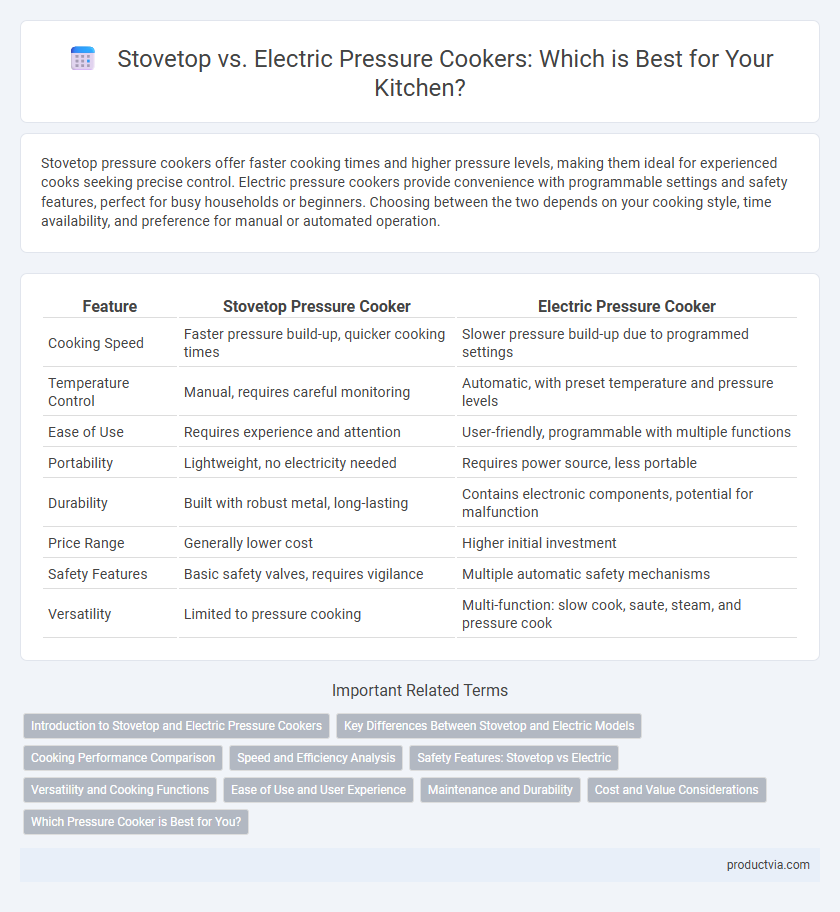Stovetop pressure cookers offer faster cooking times and higher pressure levels, making them ideal for experienced cooks seeking precise control. Electric pressure cookers provide convenience with programmable settings and safety features, perfect for busy households or beginners. Choosing between the two depends on your cooking style, time availability, and preference for manual or automated operation.
Table of Comparison
| Feature | Stovetop Pressure Cooker | Electric Pressure Cooker |
|---|---|---|
| Cooking Speed | Faster pressure build-up, quicker cooking times | Slower pressure build-up due to programmed settings |
| Temperature Control | Manual, requires careful monitoring | Automatic, with preset temperature and pressure levels |
| Ease of Use | Requires experience and attention | User-friendly, programmable with multiple functions |
| Portability | Lightweight, no electricity needed | Requires power source, less portable |
| Durability | Built with robust metal, long-lasting | Contains electronic components, potential for malfunction |
| Price Range | Generally lower cost | Higher initial investment |
| Safety Features | Basic safety valves, requires vigilance | Multiple automatic safety mechanisms |
| Versatility | Limited to pressure cooking | Multi-function: slow cook, saute, steam, and pressure cook |
Introduction to Stovetop and Electric Pressure Cookers
Stovetop pressure cookers are known for their high heat capacity, allowing faster cooking times and precise pressure control, making them ideal for experienced cooks. Electric pressure cookers feature integrated timers and automated pressure settings, offering convenience and consistent results with less manual monitoring. Both types differ significantly in design and functionality, influencing user preferences based on cooking style and kitchen setup.
Key Differences Between Stovetop and Electric Models
Stovetop pressure cookers offer higher pressure settings and faster cooking times due to direct heat control, making them ideal for recipes requiring precise temperature adjustments. Electric pressure cookers feature built-in timers, multiple cooking modes, and safety mechanisms, enhancing convenience and ease of use for busy households. The choice between stovetop and electric models hinges on balancing cooking speed, user control, and advanced programmable features.
Cooking Performance Comparison
Stovetop pressure cookers reach higher pressure levels faster, enabling quicker cooking times and better flavor infusion compared to electric models. Electric pressure cookers offer more precise temperature control and preset cooking programs, enhancing convenience and consistency for complex recipes. Both types maintain nutrient retention and tenderize food effectively, but stovetop models excel in high-heat cooking performance.
Speed and Efficiency Analysis
Stovetop pressure cookers typically achieve higher cooking speeds due to direct heat application, allowing rapid pressure buildup and precise temperature control. Electric pressure cookers offer consistent heat settings and programmable cooking cycles, enhancing energy efficiency by optimizing pressure maintenance but usually take longer to reach pressure. Efficiency analysis reveals stovetop models excel in speed, while electric versions provide convenience and steady energy use, influencing user preference based on priority for cooking time or automated operation.
Safety Features: Stovetop vs Electric
Electric pressure cookers feature advanced safety mechanisms such as automatic pressure control, lid locking systems, and temperature sensors that minimize the risk of accidents during cooking. Stovetop pressure cookers rely on manual pressure regulation and safety valves, requiring users to monitor pressure levels closely to prevent hazards. The integrated electronics in electric models provide real-time monitoring and multiple redundant safety features, enhancing user protection compared to the more traditional stovetop design.
Versatility and Cooking Functions
Stovetop pressure cookers offer superior versatility with precise manual pressure control, suitable for a wide range of cooking techniques including browning and slow cooking. Electric pressure cookers provide multiple preset cooking functions and programmable timers, enhancing convenience and consistent results for dishes like rice, yogurt, and stews. Choosing between stovetop and electric models depends on the need for customization versus automated cooking versatility.
Ease of Use and User Experience
Stovetop pressure cookers offer precise temperature control and faster cooking times, appealing to experienced users who prefer manual adjustments. Electric pressure cookers provide preset cooking programs and automated pressure regulation, enhancing convenience and safety for beginners or busy cooks. User experience often depends on individual cooking habits, with electric models favored for simplicity and stovetop versions preferred for versatility.
Maintenance and Durability
Stovetop pressure cookers generally require less maintenance due to their simple design and fewer electronic components, making them highly durable and long-lasting under regular use. Electric pressure cookers contain intricate electronic parts and sensors, which may require periodic inspection and can be prone to malfunction over time. Proper cleaning and careful handling of rubber gaskets and sealing rings enhance the durability of both types, but stovetop models often withstand wear and tear better in the long run.
Cost and Value Considerations
Stovetop pressure cookers typically offer a lower upfront cost and longer durability, making them a cost-effective choice for budget-conscious users. Electric pressure cookers provide added convenience with programmable settings but tend to have higher initial prices and potential maintenance expenses. Evaluating the balance between affordability and feature value is crucial when deciding which type suits your cooking needs.
Which Pressure Cooker is Best for You?
Stovetop pressure cookers offer faster cooking times and higher pressure settings, ideal for users seeking durability and precise control over cooking. Electric pressure cookers provide convenience with programmable settings and safety features, making them suitable for busy individuals or beginners. Choosing the best pressure cooker depends on your cooking style, time availability, and preference for manual versus automated operation.
Stovetop vs Electric for pressure cooker Infographic

 productvia.com
productvia.com